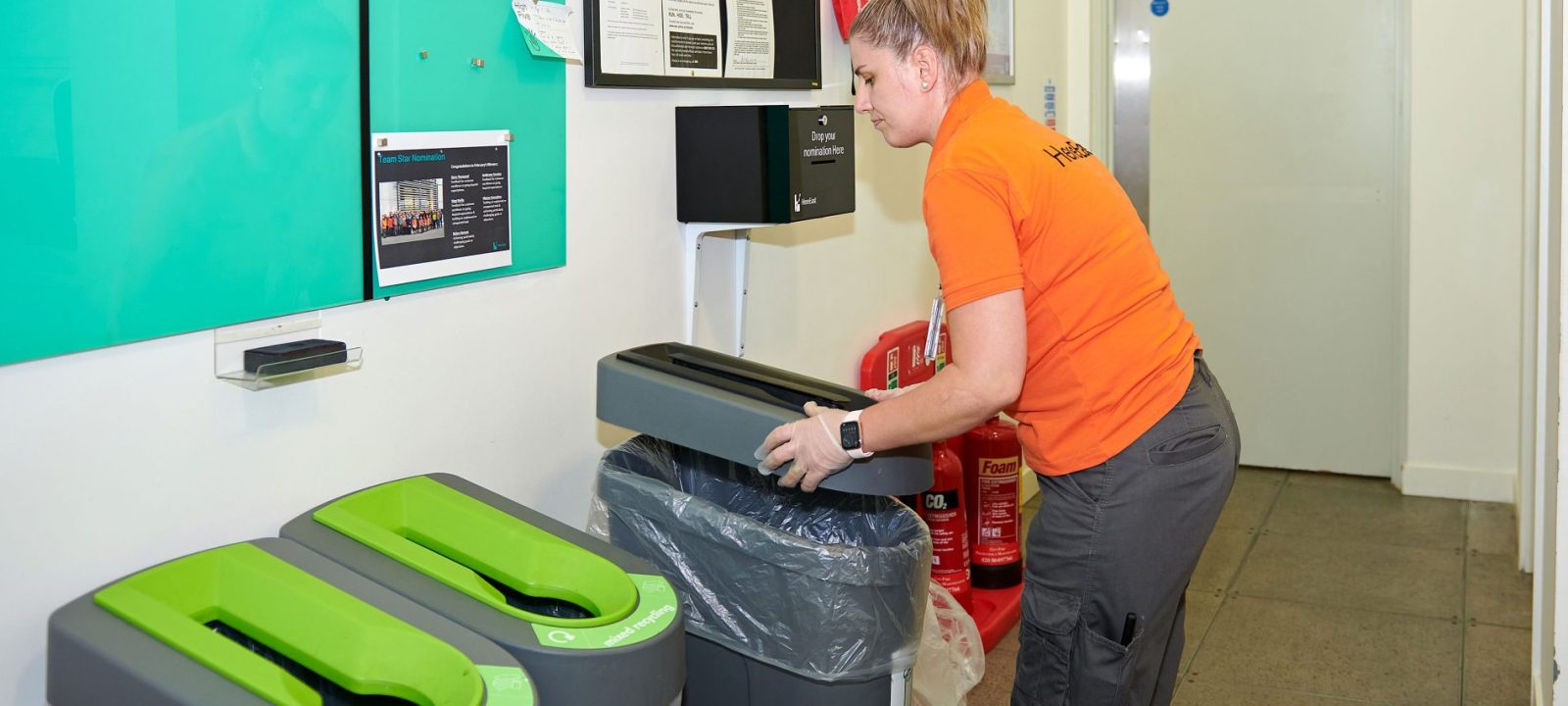On 1st April 2025, the UK government enforced Simpler Recycling – a new legislation designed to dramatically change how businesses manage waste. From warehouses, to schools, healthcare facilities, offices, and beyond, Simpler Recycling for businesses is not optional – it’s the law. Failing to separate your waste correctly could cost your business in fines, operational disruption, and reputation.
This guide breaks down exactly what you need to know – and what to do – to stay compliant, cut costs, and protect your ESG credentials:
- What Simpler Recycling is and why it matters
- How it affects your business and day-to-day waste handling
- What you should (and shouldn’t) be doing to remain compliant
- How Samsic UK is helping clients to avoid penalties and meet the new legal standards
What Is Simpler Recycling?
Simpler Recycling was introduced by the UK government’s Department for Environment, Food & Rural Affairs (DEFRA) – becoming law on 1st April 2025. All UK businesses, regardless of industry, must comply with the new waste management rules to avoid costly penalties and maintain legal standards.
Simpler Recycling Explained
The legislation aims to improve the UK’s recycling rates, which has been stagnant at 44% since 2022. With Simpler Recycling, to UK hopes to meet its target of recycling 65% of municipal waste by 2035, supporting environmental initiatives and goals of a more sustainable economy.
Under the new Simpler Recycling rules, businesses must now:
- Separate food waste and recyclable materials such as paper, glass, plastic, and metal
- Manage this separation within the ‘source’ workplace premises
- Comply – regardless of whether business premises are rented or shared, the responsibility lies with your business
Failure to meet these obligations could result in Simpler Recycling fines, reputational damage, and operational disruption.
What Does Simpler Recycling Mean For Businesses?
Whether you operate in retail, education, hospitality, healthcare, commercial services, or any other sector, Simpler Recycling requires your business to take action.
Legal Requirements for organisations of 10 or more full-time employees:
- Separate plastic, paper and card, glass, metals (including cans, tins, and foil), and food waste from general waste
- Put this separation process in place by 31st March 2025
- Implement these measures across all premises, even if employees are split between different sites
Smaller businesses with fewer than 10 employees have until 31st March 2027 to comply.
Important clarification: If your company has 10 employees spread across multiple locations (e.g. three sites with three to four staff each), you are still required to comply with Simpler Recycling. The law counts your business as a whole.
The Business Benefits of Simpler Recycling
Reduced Long-Term Waste Costs
While there are initial investments associated with implementing Simpler Recycling – such as purchasing separate waste containers or training staff on new procedures, introducing separated waste systems can lead to cleaning cost reduction and lower commercial waste collection fees over time. Recycling typically costs less than general waste disposal, making it a cost-saving cleaning strategy that pays off.
Stronger ESG and Sustainability Credentials
Accurate waste reporting improves your ESG profile and shows clients, investors, and employees you take environmental responsibility seriously, attracting business. For industries with high waste output, this can be a competitive advantage.
Innovation and Improvement
By rethinking product packaging and waste processes, businesses can unlock innovation that aligns with sustainability and efficient cleaning services.
Opportunities for Innovation
With waste management now a clearer process, there are opportunities for product, packaging, and process enhancements to support the new commercial recycling initiatives, aligning with updated sustainability credentials and efficient cleaning services.
Greater Partnership Potential
Collaborating with local authorities, suppliers, and commercial waste collection providers opens up opportunities to exchange knowledge, strengthen community impact, and improve efficiency.
How To Implement Simpler Recycling in 6 Steps
Step 1: Understand the legislation
Understand the legislation and what is required, limiting the possibility of future mishaps or potential compliance risks or failures.
Step 2: Conduct a waste audit
To support the planning of new waste management protocol and waste collection services, identify what waste you produce, where it’s generated, where it’s stored, and how it’s handled. A professional audit supports both compliance and ongoing improvements.
Step 3: Plan a Suitable Waste Management System
- Separate labelled bins for plastic, paper and card, glass, metals, and food waste respectively.
- Separate waste containers for waste collection services
- Introduce signage and labelling to guide employee’s waste disposal action
Step 4: Staff Training and Awareness
All staff involved in waste handling—whether internal team members or external cleaning providers—must be fully trained on the new processes. From the front-line to facilities management, every individual plays a role in successful implementation.
Step 5: Review Waste Collection Providers
Review your current commercial waste collection contracts. You may need to update agreements or switch providers to ensure separated materials are collected and processed correctly.
Step 6: Conduct Regular Reviews
Schedule regular audits to check compliance and identify ways to improve your system. Review training, signage, and processes to adapt to changes in your operations or staffing.
What Not to Do: Common Simpler Recycling Rollout Mistakes
Even though it’s called “Simpler,” things can quickly go wrong. Avoid these common errors:
- Don’t assume all councils collect the same waste: Check local rules or consult your private waste provider
- Don’t skip staff training or signage: Untrained teams or unclear signage leads to confusion, contamination, and penalties
- Don’t stick with outdated waste contracts: If your provider hasn’t adapted, your business risks non-compliance
- Don’t leave responsibility unassigned: Appoint someone, such as a Facilities Manager or ESG Manager, to oversee compliance.
How Samsic UK Is Supporting Businesses
At Samsic UK, we’ve already helped hundreds of clients futureproof their waste management with:
- Free site-specific waste audits to assess current compliance
- Bin bags, refuse containers, and other materials to support the separation of waste
- Fully-trackable ESG reporting and Compliance monitoring
- Staff training programmes for cleaning teams and internal personnel
- Partnerships with trusted waste collection providers to ensure legal compliance
With our help, clients stay ahead of regulatory changes, reduce costs, and build better sustainability strategies.
Ready to futureproof your business against the risks of non-compliance?
Simpler Recycling for businesses is more than just another compliance issue – it’s a critical opportunity to improve environmental performance, reduce waste-related costs, and prepare for a greener future.
Don’t Wait Until You’re Fined
Simpler Recycling is already in force. Is your business 100% compliant?
- Get a free audit from Samsic UK’s waste experts
- Save on commercial waste costs
- Strengthen your ESG reporting
Request Your Compliance Audit Now
FAQs
What if my landlord hasn’t provided bins or separated waste?
Your business is still legally responsible. We can supply internal bins and liaise with your landlord if needed.
If I am a Samsic client, is this included in my contract?
Yes! All clients get full access to our waste compliance and ESG support services.
Is ESG reporting included in Samsic’s waste management service?
Absolutely. We offer monthly reports with detailed waste stream data and carbon impact tracking.
Do I need to implement Simpler Recycling at all of my sites?
Yes. Each of your business locations must comply. We’ll help ensure consistency across them all.









